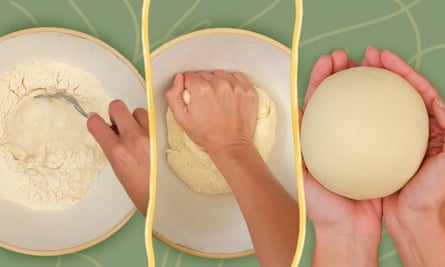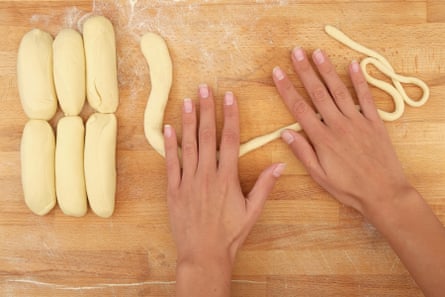To the uninitiated, making pasta from scratch can seem extra bother than it’s price. In any case, why spend your hard-earned money on a big, costly, hyper-specialised pasta machine when you should purchase a packet of dried grocery store spaghetti for $2?
And for individuals who need to have a crack, the web has a trove of intimidating movies: masterful Italian cooks sculpting egg, flour and water into marvellous shapes, with a ability and dexterity handed down by the generations. However whereas the limitations to entry can really feel insurmountable, they don’t should be. The primary pasta makers didn’t possess a Marcato.

“You may simply do it so merely. It’s simply flour, water and a picket bench,” says Ellie Bouhadana, head chef at Melbourne’s Hope Avenue Radio.
Pre-pandemic, Bouhadana was working in an Italian kitchen and operating pasta pop-up occasions across the metropolis; throughout lockdown, she constructed a preferred pasta supply enterprise. Regardless of her culinary successes, there’s a caveat. “I might not say I’m a pasta knowledgeable in any respect. I make it as a result of it’s enjoyable and I’ve realized how I love to do it.
“I might by no means say it’s conventional.”
Hope Avenue Radio co-owner Pete Baxter believes the additional time required to arrange pasta at house is definitely worth the effort: “You’re by no means going to get the identical sort of sauce attachment with store-bought pasta … Additionally, the feel is absolutely chewy and distinctive.”
For some entry-level tuition, Bouhadana has chosen three machine-free pasta shapes of progressing complexity: pici, an extended pasta, adopted by cavatelli and orecchiette. Some liberties have been taken to streamline the steps for learners – for example, utilizing one easy dough recipe for all three shapes.
Take into account these directions as introductory encouragement moderately than ham-fisted cultural perversion. We beg the forgiveness and understanding of knowledgeable nonnas and nonnos in every single place.
Making the pasta dough
With simply flour and water, this is likely one of the easiest pasta doughs, and can be utilized for a lot of hand-formed shapes. Some wish to season their dough with salt, however Bouhadana says salt crystals can tear the dough throughout shaping. She prefers to let closely salted water season the pasta on the cooking stage.

Serves 4
400g semolina flour, plus additional for sprinkling
200g room-temperature water
Place the semolina flour on a floured benchtop or in a deep bowl, and type a effectively within the centre. Pour within the water. Regularly mix the flour and water to type a free dough utilizing your fingertips by ranging from the center then working outwards.
Knead dough firmly for 10 to twenty minutes till easy. The extra you knead, the extra the gluten molecules will bond, leading to bouncier pasta. Cowl with a clear tea towel and put aside to relaxation for half-hour to at least one hour.
Easy methods to make pici
Originating within the Tuscan province of Siena, pici takes its title from “appiciare”, the method of rubbing the dough between your palms and fingers to type lengthy irregular ropes. Historically, pici dough makes use of tipo 00 flour and infrequently consists of olive oil.
“Pici is the best way to start out,” says Bouhadana. The thick, textural noodles require minimal precision, and he or she prefers their uneven, handmade nature over spaghetti.
Says Baxter, a father of two: “It’s a very good one for teenagers … It’s enjoyable and you’ll’t actually get it improper.”
Directions

Reduce your rested dough into eight parts. On a floured bench, roll every bit on a bench right into a stout log.
Maintain down one finish of the dough with one hand. Along with your different hand, roll the opposite finish of the dough backwards and forwards, in direction of and away from you, whereas additionally utilizing strain with the palm of your hand to drag the dough throughout the bench to type lengthy ropes. Repeat with remaining dough parts.

Maintain up a rope between your palms and rub it backwards and forwards between your fingers. Every strand must be about 5mm thick (it would increase upon cooking). Repeat with remaining ropes. (For a easy noodle, roll solely on the bench till the specified thickness is reached.)
The pici is finest cooked instantly. To cook dinner the pici, boil in salted water for 3 to 5 minutes or till al dente (cooking occasions will differ relying on thickness). Drain and toss by your most well-liked sauce.
Serving suggestion: Cacio e pepe.
Easy methods to make cavatelli
Originating in southern Italy, cavatelli resembles outsized oats and is served with quite a lot of sauces, together with a easy tomato sauce, or with seafood in coastal areas. In Molise, throughout the mid-January feast of Sant’Antonio Abate, cavatelli is eaten with pork ragu.
after publication promotion
Historically, cavatelli are rolled alongside a ridged picket board to type their grooves, however in step with the minimalist kitchen theme, Bouhadana suggests merely utilizing the again of a daily fork. Throughout your first try at making cavatelli, it’s smart to goal for amount over high quality otherwise you’ll be having a late dinner.
“You may actually make it any measurement you need. I simply choose tiny ones … you need to have that little pocket within the center that the sauce can seep into,” says Bouhadana. “I need to eat pasta with grooves with a bolognese or sausage ragu, as a result of that’s going to stay and get all texturally scrumptious.”
Directions
Equally to the pici recipe, divide the dough into eight parts, and roll alongside a floured bench to type lengthy ropes.
Maintain up a rope between your palms and rub it backwards and forwards between your fingers. Every strand must be about 1cm thick. Repeat with remaining ropes.

Reduce the dough strands into 1cm squares.

Making use of medium strain, use your thumb to roll a chunk of dough alongside the again of fork and away from you, till it curls over the again of your thumb and off the fork. Repeat with remaining dough.

The cavatelli is finest cooked instantly. Boil in salted water for 3 to 5 minutes or till al dente. Drain and toss by your most well-liked sauce.
Serving suggestion: Sausage ragu.
Easy methods to make orecchiette
After you’ve mastered cavatelli, it’s time for orecchiette, a form from Puglia. Right here although, we add an additional step by opening up the curl on the finish to type “little ears” – which is what “orecchiette” means.
“The primary few that you just make will usually look a bit bizarre. You’re gonna make a few hundred, so that you’re going to get higher,” says Baxter. “You need the dough to stay to the rolling floor a tiny bit for texture, to assist the sauce stick with the pasta.”
Directions
Observe the cavatelli recipe till step three. It’s best to have 1cm squares of pasta dough.

To form the orecchiette, take a chunk of dough. Place the tip of a butter knife on the facet of dough closest to you. With the knife blade parallel to the bench, push down and away as firmly as you’ll be able to with out breaking the dough. The dough ought to curl up and across the again of the knife.

Place your thumb or forefinger on the convex facet of the dough. Fold again the sides of the dough to type an orecchietta. Repeat with the remaining dough.
The orecchiette is finest cooked instantly. Boil in salted water for 3 to 5 minutes or till al dente. Drain, and toss by your most well-liked sauce.
Serving suggestion: Cime di rapa, bitter inexperienced leaves, or broccoli rabe; with garlic, chilli, anchovies, olive oil and breadcrumbs.


